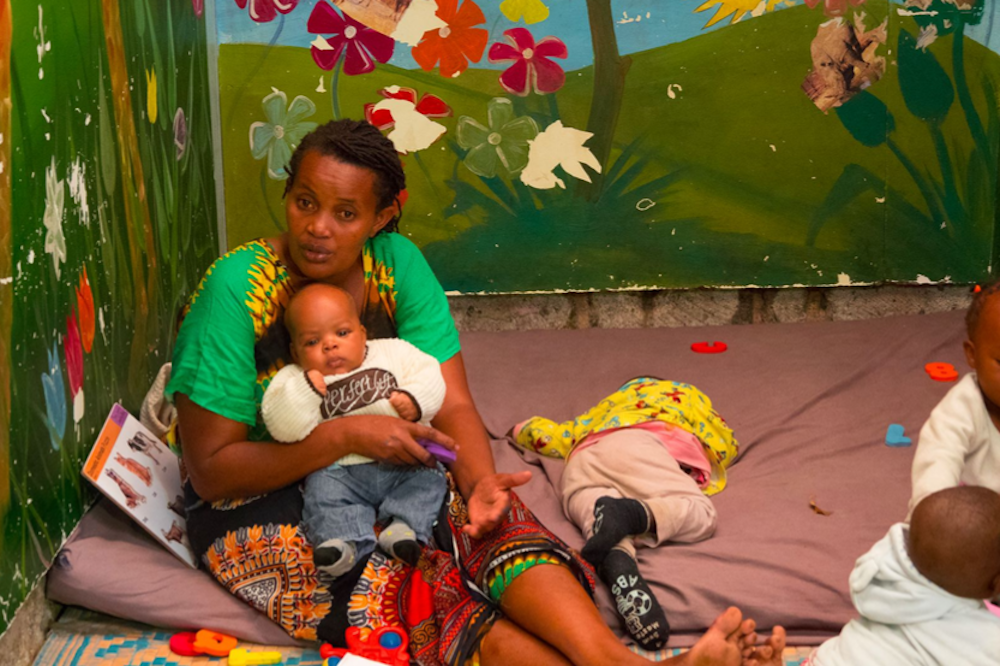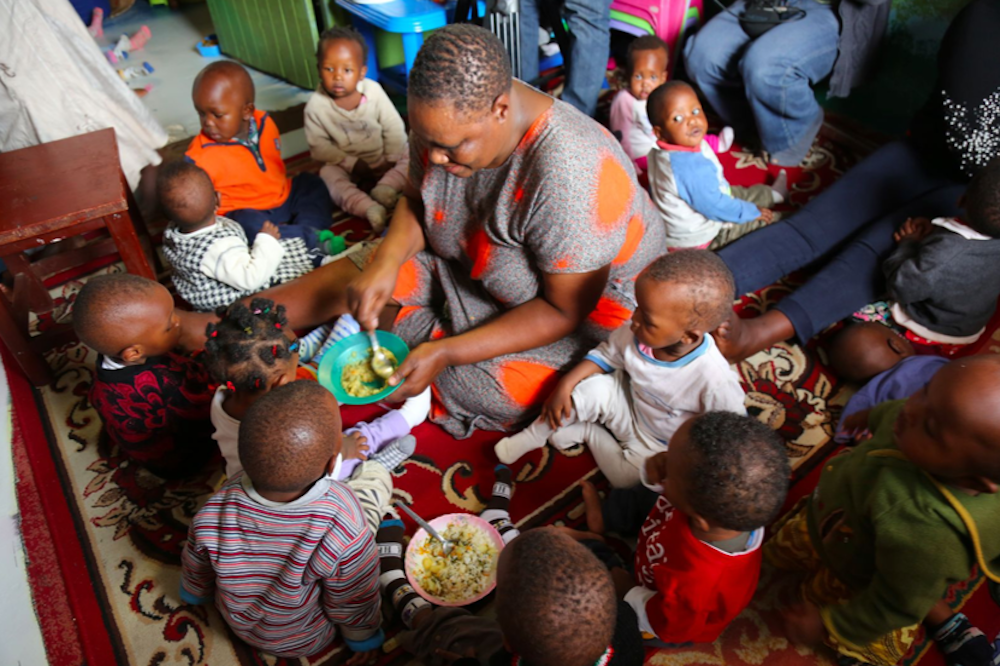“Children who come to day care are confident, happy, alert and can express themselves”

Childcare, Early childhood development, Learning through play (Early years), Safe pregnancy and birth, Teachers and learning
This week Theirworld is looking at the early childhood development workforce who help children under the age of five to grow and flourish - today we talk to two day care owners.
Every child in the world deserves to fulfil their potential. That means giving them quality care and nurturing in the crucial first few years of their life.
By the time a child reaches five years old, 90% of their brain has already developed. During that time, they need access to quality care, including the five vital areas of nutrition, health, learning, play and protection.
That’s why Theirworld’s #5for5 campaign is calling on leaders to help make early childhood development a top priority.
The early childhood development workforce has a key role to play. In a special series this week, Theirworld talks to teachers, health workers and day care owners and managers about the challenges and the joys of helping to give children the best start in life.
Esther Wambui Njuguna, a day care owner
I used to be a social worker and I have been the owner of Victorious Day Care in Kariobangi – an area of Nairobi in Kenya – for three years.
I do this because I love children and it does not feel like a job. We normally have between 24 and 27 children between six months and three years of age.
We don’t recommend bringing children under six months because they are still breastfeeding and it will be a challenge to have the mother come here all the time.
We encourage exclusive breastfeeding for six months because mother’s milk boosts immunity among other things.
Tiny Totos (a social enterprise institution) helped me by first relocating my day care from a dangerous place in Korogocho slums. They trained me on childcare, nutrition, joint stimulation, giving the children an opportunity to express themselves, even going out to get some sunlight.
Parents mostly leave their children at the day care because they are going to work. But there are many things the parents don’t know such as parental love, cooking for children, nutrition, feeding, a good environment – all these are found here.
The parents also leave them here for socialisation, to learn how to walk, talk and interact with other children.
The Kenyan government is lax in aiding in early childhood development. For a child to be a good and productive adult he needs to have a good foundation. Also the council licences are very expensive and the government should look into it.
There’s a big difference between a child being raised at a day care and those brought up by a house help at home. Those at the day care are confident, happy, alert, can express themselves but those in the house are mostly reserved.
My days start as early as 5.45 am and we have a routine.
In the morning it’s free time for the child to do anything until 9.30 am when we give them something to drink.
We teach the children to sing, pray, wash hands, play with puzzles and blocks and scribble. Esther Wambui Njuguna, day care owner
Then we sing and play until around 10 when we change them. At 11.30 we prepare them to eat. After lunch they play for about 20 minutes then they go to sleep until 3.30pm before they start going back home.
The children have their own games. Some play with sand, others sing, run, play soccer and others just like taking in the sun. Some also play with water – which the parents don’t like but we tell them the children have to be allowed to feel things, texture among other things.
We encourage parents to take their children to hospital if they are not well. If they fall sick at the day care I take them to hospital, especially if it is an emergency.
Tiny Totos has given us a health worker who comes monthly to check on the children’s weight, height and nutrition and make observations and recommendations that also help us cater to the children’s needs.
We teach the children to sing, pray, wash hands, play with puzzles and blocks, scribble, discipline among other things.
When it comes to disciplining them, especially for toys, you take them away and give them a time out. That is really effective. Parents should show the children that there is sharing and waiting for things, not just demanding and getting straight away.
We have meetings with the parents to tell them how to behave at home for the betterment of the children. Mostly they don’t know how to raise their children. I wish there could be such training before they get children.
This job is good – however if you don’t have a heart for children you will not be able to do it. It is not business as usual because you hold the lives of the children in your hands.

Esther Wairumu has been running the business for seven years and continues to be driven by her love of children (Esther’s Daycare)
Esther Wairimu, day care owner
I am the owner of Esther’s Day Care in Nairobi. We normally have about 42 children here every day between the ages of six months and three years.
This is my seventh year of doing this business. My motivation is the love I have had for children ever since I was a young girl. It is not an easy job but I love it.
I normally open as early as 5.20am and we have a routine we follow.
From 9am we wake them up to relieve themselves, wash their hands and give them porridge. Then we play and sing and some go to bed around 11 am.
At 12.30pm we give them their lunch then play for about 20 minutes, then they sleep. We start waking them up at around 3 and at 4.30 we give them porridge and at five they start going back home.
They all play together and sing together without any segregation.
We charge 100 shillings per child per day. There are some parents who pay 130 shillings because their children eat supper here.
One of the challenges I experience with the children is when their parents come to pick them late at night. Some children even sleep over, although I discourage it.
Tiny Totos has really helped me a lot. They found me a place for the children and another for myself to live.
I never thought I would be able to cook for the children. I used to warm food for 25 children on the stove – I did not have the idea to cook until they told me of it and they even bought me a gas cooker.

Early childhood development
Since I started cooking the children have been gaining weight, to the joy of parents, because of the balanced diet that I was taught.
Today they are eating rice instead of mashed potatoes because of the expensive cost of potatoes currently.
Most of the parents who bring their children here say it is expensive to hire a house help. They are not well taken care of and they are not eating well.
The government is not helping in bringing up children. I would prefer them to reduce the cost of the operating licence. Last year we paid 20,000 shillings and this year it is 24,000 shillings plus I also have to pay for the signboard.
In disciplining the children, we talk to them as well as the parents. Some children are spoilt as they are the only child and doesn’t want to share. In talking to them we show them the benefits of sharing and playing with others.
We also train the parents on proper child upbringing. The parents mostly expect us to do everything and them nothing. They don’t want to stay with their children, which is not good.
This kind of business has really helped the women in the area who can leave their children here and can go look for employment elsewhere. It has also helped parents as well as myself.
More news

Take the test and discover how our Schools Hub helps students grasp the global education crisis
